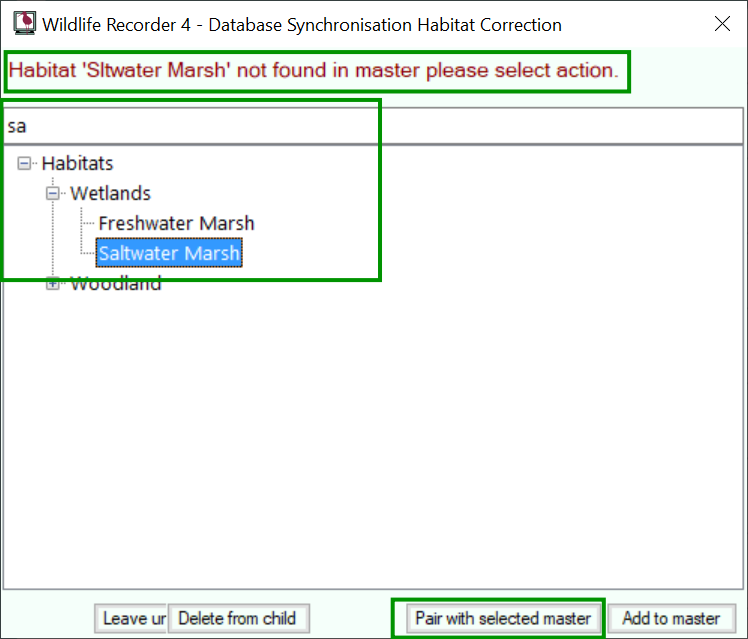Database synchronisation - Habitat correction
Synchronising habitats is performed by first matching the habitat names from the database being synchronised (child database) with the master database. Where a match is found those habitats become automatically paired so that in future all changes to the habitat made in any of the databases will be reflected in the other databases. During the matching process certain problems may be encountered if the details do not match.
Reasons for matching problems can include:
- The habitat is on the child database but is not on the master database. In this case you can ask to synchronisation to add it to the master database and pair the two.
- The habitat name is spelled differently on the child and master databases. In this case you can ask the synchronisation to pair the misspelled habitat with the master. The spelling will be corrected in the child database and the two will be paired.
- The habitat is not in the same place in the habitat tree as it is on the master database. In this case you can ask the synchronisation to pair the misplaced habitat with the master. The habitat will be put in the correct place in the habitat tree in the child database and the two will be paired.
Once the matching has been completed, any habitats which are in the master database but not in the child database will be added to the child database and pared.
Problem resolution- Habitat spelled differently in child database
The list of habitats in the master database is displayed. And the problem can be resolved by finding and selecting the correct habitat in the master and then pairing the two by clicking the Pair with Selected Master button.

A habitat can only be paired with a single habitat in the master database. If the master database habitat you chose has already been paired with a different habitat in your child database you will get an error message.
In this case you can decide to resolve the issue manually by clicking the Leave unpaired button, or, if the habitat in the child database is no longer required and is not used in any locations you can delete it by clicking the Delete from child button.
Problem Resolution - Duplicate or redundant habitat in the child database
In some cases you may have the correct habitat in the child in addition you may also have a misspelled or redundant habitat which you no longer need.
In this case you can attempt to remove the habitat by clicking the Delete from child button. If the selected habitat is not used in any locations it will be removed from the database. If it is used in any locations you will get a warning message. In this circumstance you must click the Leave unmatched button. When the synchronisation has completed you can open the child database and resolve the issue manually.
Problem Resolution - Valid habitat in child database not in master
In some cases you may have a habitat in the child which is not in the master, but you want to keep that habitat. Click the Add to master button, the habitat will be added to the master database and paired with the habitat in the child database.
